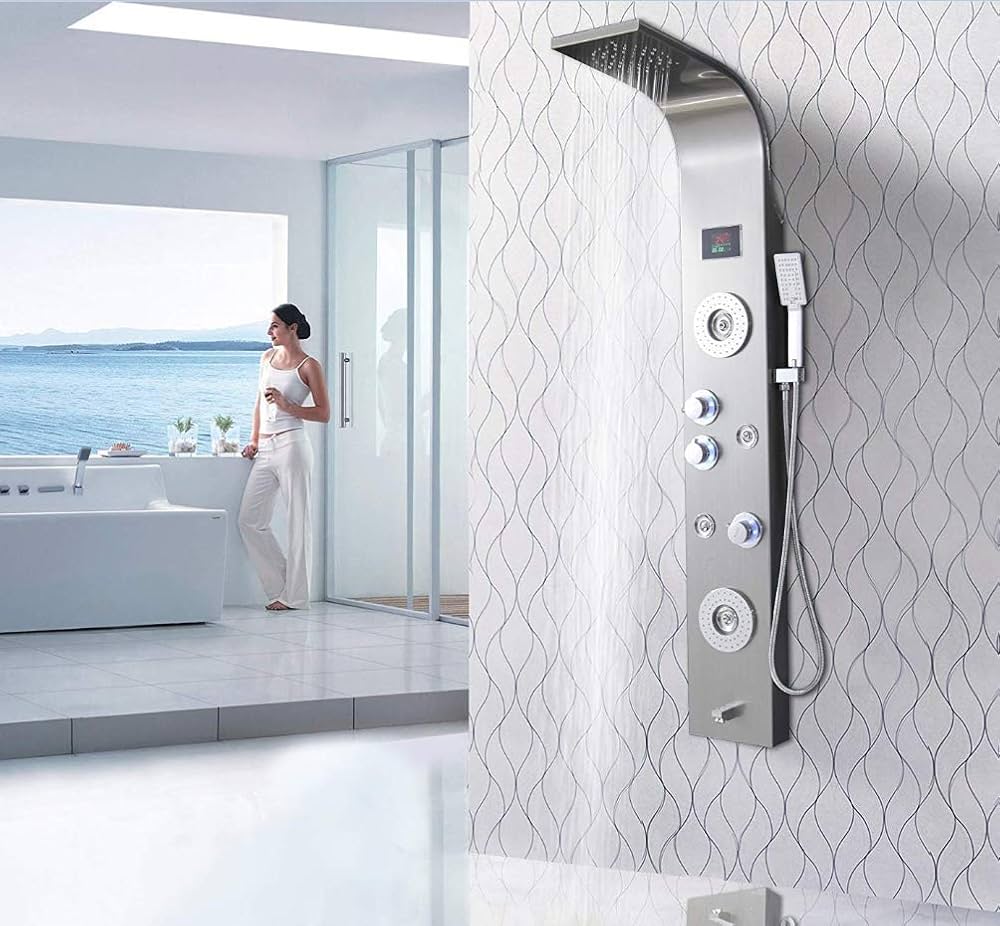Designing a bathroom that looks elegant and performs reliably over the years starts with choosing the right materials, especially for areas constantly exposed to water and steam. In a city like Mumbai, where humidity levels stay high for most of the year, this decision becomes even more critical. If you are exploring Bathroom Accessories in Mumbai, understanding the best material for shower panels can save you from frequent repairs, water damage, and premature wear.
A shower panel is not just a design feature; it is the backbone of your daily bathing experience. From housing a premium shower head in Mumbai to supporting advanced jets and thermostatic controls, the panel material determines durability, hygiene, and long-term value.
Why Shower Panel Material Matters in High-Moisture Bathrooms
Bathrooms are exposed to water, heat, and humidity every single day. In coastal cities, moisture lingers longer, increasing the risk of corrosion, mould, and surface damage. Shower panels sit right at the centre of this environment.
Choosing the wrong material can lead to:
-
- Rust and corrosion
-
- Water seepage behind walls
-
- Discolouration and stains
-
- Mould growth and hygiene issues
-
- Reduced the lifespan of fixtures
That’s why premium brands offering the Best Shower Systems In Mumbai focus heavily on material quality, not just design.
Stainless Steel Shower Panels – The Most Reliable Choice
When it comes to performance in high-moisture conditions, stainless steel stands out as one of the most trusted materials.
Why Stainless Steel Works So Well
Stainless steel shower panels are engineered to resist corrosion, making them ideal for humid environments. They maintain their finish even with daily exposure to hot water and steam.
Key advantages include:
-
- Excellent resistance to rust and corrosion
-
- Smooth, non-porous surface that prevents mould buildup
-
- Easy to clean and maintain
-
- Modern, premium appearance
-
- Long service life
Most high-end Best Multi Function Showers In Mumbai are built on stainless steel panels because they support multiple outlets, such as rain showers, body jets, and hand showers, without compromising structural strength.
Aluminium Shower Panels – Lightweight but Limited
Aluminium shower panels are often chosen for their lightweight structure and cost-effectiveness. While they can work in controlled environments, they may not always be the best fit for extremely humid bathrooms.
Pros and Cons of Aluminium Panels
Advantages:
-
- Lightweight and easy to install
-
- Generally more affordable
-
- Sleek, contemporary finish
Limitations:
-
- Can dent easily
-
- Requires proper coating to resist corrosion
-
- Shorter lifespan compared to stainless steel
In Mumbai’s moisture-heavy climate, aluminium panels must be anodised or powder-coated to ensure durability. Even then, they may not match the longevity of stainless steel options used in premium Bathroom Accessories in Mumbai.
Tempered Glass Shower Panels – Stylish but High Maintenance
Glass shower panels are popular for their minimal and elegant appeal. They often combine tempered glass with metal frames or backing panels.
Are Glass Panels Suitable for High-Moisture Spaces?
Tempered glass is water-resistant, but it comes with certain trade-offs:
-
- Requires frequent cleaning to prevent water spots
-
- Soap residue and mineral deposits are more visible
-
- Framing material becomes critical in humid environments
While glass panels add visual luxury, they work best when paired with corrosion-resistant metals and high-quality seals. Many modern bathrooms use glass as a design layer rather than the core material for advanced shower systems.
ABS and Acrylic Panels – Budget-Friendly Alternatives
ABS plastic and acrylic shower panels are commonly found in budget bathroom setups. They are water-resistant but not always ideal for long-term use in high-humidity areas.
What to Expect from Plastic-Based Panels
Benefits:
-
- Affordable
-
- Lightweight
-
- Easy to install
Drawbacks:
-
- Can discolour over time
-
- Less resistant to heat
-
- May crack or warp with prolonged use
These materials are better suited for temporary installations or low-usage bathrooms rather than primary spaces fitted with advanced Best Shower Systems In Mumbai.
How Material Affects Shower Performance and Features
The material of your shower panel directly influences how well your shower system performs. A solid, corrosion-resistant panel ensures proper water pressure distribution and supports multiple features.
High-quality panels allow seamless integration of:
-
- Rain showers
-
- Body massage jets
-
- Handheld showers
-
- Thermostatic mixers
-
- Waterfall outlets
This is especially important when selecting a premium shower head in Mumbai, where water pressure consistency and fixture stability matter.
What Professionals Recommend for Mumbai Homes
Interior designers, plumbers, and architects working in coastal cities consistently recommend stainless steel-backed shower panels for long-term performance. These panels handle humidity, frequent temperature changes, and hard water conditions better than most alternatives.
If you are upgrading or building a new bathroom, investing in premium materials upfront helps avoid recurring maintenance costs later.
Choosing the Right Shower Panel for Your Bathroom
Before finalizing your purchase, consider these practical factors:
-
- Daily usage frequency
-
- Bathroom ventilation quality
-
- Hard water exposure
-
- Design preferences
-
- Compatibility with multi-function systems
Premium Bathroom Accessories in Mumbai are designed keeping these real-world conditions in mind, ensuring both aesthetics and functionality.
Why Quality Matters More Than Price
While budget options may seem attractive initially, shower panels are not something you want to replace frequently. A high-quality panel ensures safety, hygiene, and comfort for years to come.
Brands specializing in the Best Multi Function Showers In Mumbai focus on durability, precision engineering, and premium finishes that elevate everyday bathing into a luxury experience.
Final Thoughts: The Best Material for High-Moisture Bathrooms
For high-moisture spaces like Mumbai bathrooms, stainless steel shower panels remain the most reliable and future-proof choice. They balance durability, hygiene, and design while effortlessly supporting advanced shower features.
If you are planning a bathroom upgrade or selecting premium fittings, explore high-quality shower panels and accessories from trusted manufacturers.
Upgrade Your Bathroom with Salus
Discover thoughtfully designed shower panels, premium fittings, and advanced shower systems built for Indian conditions. Explore the complete range of bathroom solutions at https://salusindia.com/ and experience the perfect blend of performance, durability, and modern design.
FAQ’s
1) What is the best shower panel material for humid bathrooms?
Stainless steel is the best material for humid bathrooms due to its corrosion resistance, durability, and ease of maintenance.
2) Are stainless steel shower panels difficult to maintain?
No. Stainless steel panels require minimal cleaning and resist stains, rust, and mould effectively.
3) Can glass shower panels handle high moisture?
Tempered glass can handle moisture, but it needs regular cleaning and must be paired with corrosion-resistant framing.
4) Which shower panel works best with multi-function showers?
Stainless steel panels provide the strength and stability required for Best Multi Function Showers In Mumbai.
5) How long do premium shower panels last?
High-quality shower panels can last 10–15 years or more with proper installation and regular maintenance.


